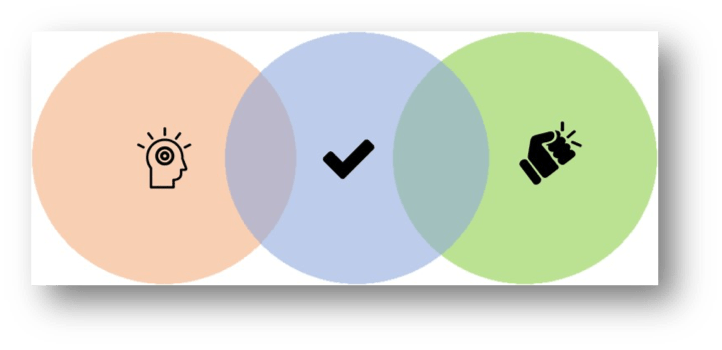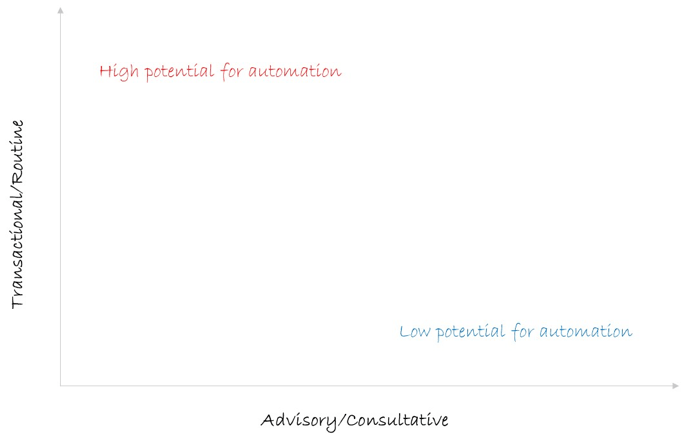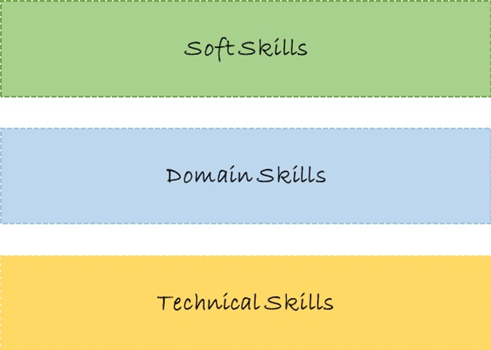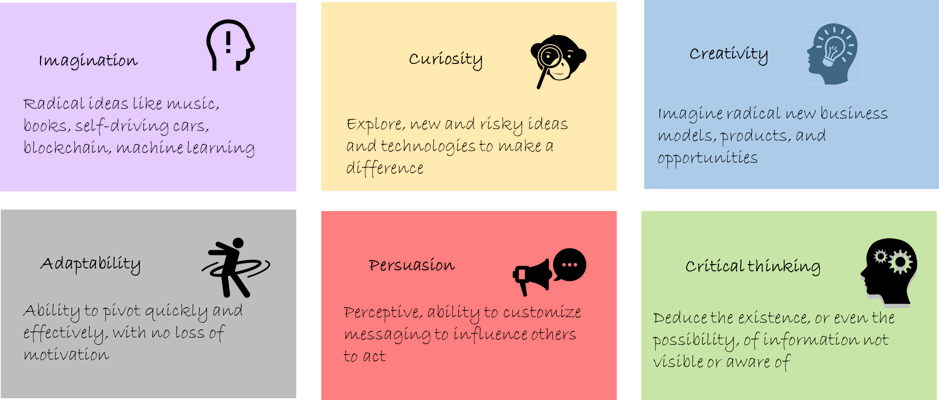It was the best of times, it was the worst of times
As Jeff sat at his desk, waiting for his laptop to boot, it was just another day at work. A sunny Wednesday morning with hardly any traffic snarls to navigate, Jeff had breezed in to work early as he always did. He scanned his emails and got right to work. A high potential employee at a mid-sized IT firm, Jeff demonstrated all the right traits: he conceptualized new strategies, took the initiative to execute those strategies successfully, was highly involved in mentoring his team members, and was generally the first choice of his superiors to work on high priority projects. Well-liked by his peers and managers, Jeff had a great professional track record to boast of.
So later that morning, when his boss invited him for a ‘talk’ in his cabin and opened the conversation with a “What do you plan to do next?”, Jeff was unprepared on how to respond.
Now you might wonder, what’s so difficult about this question? Most of us would know what we’d like to have – a new role, a challenging assignment, change teams, departments or even companies. We’d also know the underlying reasons – better salary, better opportunities, change of location and more. As competent individuals who are good at what we do, we deserve what we ask for.
But what if your organization’s priorities have changed? In the new scheme of things, your skills are no longer needed. The change in priorities can be due to anything – technology, process or simply political. Your competencies don’t count, your ability to get things don’t matter, your knowledge and expertise become inconsequential.
When “What do you plan to do next?” assumes a negative shade, one that threatens your carefully nurtured professional existence, what would you do then?
The age of AI and the inevitable automation means questions like these are likely to become more frequent. The question we need to ask ourselves then is, “How prepared are we to change, adapt, or pivot?”
If we ever found ourselves in a situation like that of Jeff’s, what would be our initial reaction? What would we do next?
Typically, we’d reach out to trusted mentors, friends and family. We’ll go on job portals such as LinkedIn or Monster to update our profiles, look for opportunities, and connect with recruiters.
But who can really understand your professional journey as holistically and as intimately as only you can? The highs, the lows, your aspirations, what excites you, your values and core beliefs. You, a composite of attitude and aptitude exclusive to you, what makes you unique?
This is something that only you can answer best.
Viral, Aspirational and Transient
In a world, where anything and everything can be counted as data, how do you make sense of the noise? Be it job portals, social media accounts, emails or websites that you follow – every single place is a source that generates, with increasing frequency, more data than you can possibly go through or comprehend.
How do you detect the right signals that make sense to your career and to your life?
How does one stand out in a world that’s increasingly viral, aspirational and fleeting?
Instead of searching for signals buried in abundant noise, what if you were to flip the whole concept? What if you shifted your focus to generating signals?
Wouldn’t this be the best way to meet glorious uncertainty head-on? Then again, what could be the alternatives? There are no definite answers.
What this does underscore is how little we really know about what might work and what might not.
Uncertainty with Agility
For some time now, especially in the software development space, being agile has replaced the traditional waterfall model, preferring actual working outcomes to structure and lengthy processes. While we all understand the importance of moving with agility, the path where it should lead, is often uncertain. Resilience and the ability to pivot at the right time are critical.
Let me give an example –
Increasingly, companies are moving to public cloud. It’s predicted that by 2025, 80% of a typical organization’s infrastructure would be managed by the likes of Amazon, Google and Microsoft. Even highly regulated industries such as banking, financial services and healthcare are strongly mulling over or have already begun to adopt this shift. What happens to the thousands of in-house jobs?
There are numerous such examples, cutting across functions and organizations – of roles that will be completely redundant or extinct.
But therein, also lies opportunities.
3 A’s
To meet uncertainty of such magnitude, the 3A’s framework, can be a powerful focusing tool. While intuitive at first glance, it demands deep mindset and behavioural shifts.

Aware
- How well do you understand the context of your company’s operating environment?
- What sweeping changes impact your industry?
- Are you aware of the shifting priorities and dynamics of your department, team or project?
- What are the challenges and long-term prospects of your role?
Accept
- Do you agree the pace of change has quickened?
- How long could your existing skills sustain your professional journey?
- What new skills and capabilities would you need to thrive, despite the flux?
Act
- Have you come up with a blueprint for your career? (Focus Areas)
- How do you plan to fill the details in your blueprint?
- When will you start to act on your blueprint? (Pivot, if needed)
So how do you get started?
SWOT Analysis
It’s commonplace for businesses to do a SWOT analysis when devising strategies such as entering a new market, competing with incumbents, new entrants and so on. A rare instance is that departments and teams perform a SWOT analysis on themselves.
In my last role, I was heading Market Research for RBS. To build greater awareness within my team, I asked my team of research analysts to do a SWOT Analysis of the work our group did. The outcomes were interesting. While there were lot of strengths that the team identified, the team in the process, became acutely aware of the threats facing the group. Digitalization of some of the core processes and paid research sources could easily put the group in an existential crisis mode. A highly possible reality, this was not something the team would’ve thought of, let alone arrived at, had it not been for the collective analysis.
Rarer still is, when individuals perform SWOT analysis on their roles, their career journey so far. I can say from personal experience, for such an exercise to yield powerful results, it should involve an ability for deep introspection coupled with an understanding of the macro details.
The rapid pace of automation means we should be able to take a step back and assess whether what we do, either in parts or in entirety, fall along where on the two axes –

Controllables vs Uncontrollables
It’s a given that the nature of your jobs will change quickly, your company will transform swiftly — most of it would be uncontrollable, wrought by external forces. The fact that you are regarded as an expert or a high potential individual in the existing scheme of things wouldn’t necessarily insure you from the future.
The key takeaway from the SWOT analysis would be that it’ll zoom your focus on the ‘controllables’. How you plan, what you’ll choose to focus on, how you’ll respond to the changes – all within one’s control and these are the controllables we’d do well to think of.
Skills of the Future
According to a McKinsey report, 45% of the work that we do today, can be easily automated even with current technologies.
Even if that isn’t the case, the exercise should still spur you on to research what are the emerging trends, and identify what skills do the new and exciting roles demand.
Speaking of which, skills can be broadly of three kinds –

Most technologists are typically interested in honing their technical skills. Programming languages, databases, processors – these fascinate them. Then there are the domain experts, with vast and in-depth knowledge of an industry or function such as investment banking, capital markets, payments and more.
Techno-functional experts are those who combine the best of both worlds, technology and domain, with a major focus on solving business problems. Growing field of data science is a testimony to the power of techno-functional expertise.
Until Technological Singularity
Technological singularity when AI machines first match and then exceed human intelligence.
Most employees are expected to have soft skills such as communication, collaboration and team work. For a long time, employees with excellent technical skills or with a solid domain understanding were regarded as indispensable. People would get promoted to management because they were technically or functionally competent. It was assumed that either they were in-born with or would automatically develop skills such as the ability to lead, mentor and inspire their teams.
Few years back, when I was in business school, we had a session by a guest speaker. The speaker was going to give a talk on “creative thinking”. Most students chose not to go because in their words, “it was just some soft skill”.
But all that is set to change.
If recent research is to be believed, AI has the potential to automate most tasks performed by programmers today, with few sources claiming that in the next 20 years, AI will completely replace human codes.
But we don’t have to wait for that kind of a future. To quote LinkedIn’s CEO when he appeared on CBS last week, “Skills gap for interpersonal skills (including communication, reasoning, and team coordination) is three times the size than that of software engineering”.
What this means is that while technical and domain skills would continue to be important, in the newer scheme of things, skills such as creativity, empathy, ethics and perseverance would assume a never before-seen prominence.
It’s tempting to dismiss these as common knowledge, known to all. Yet, only a few really understand that soft skills pretty much power everything; from ideating, creating, pivoting to sustaining businesses, networks and relationships.
And just like hard skills, soft skills are developed with persistence, practice and experience. AI’s progress might just be the spark that’ll compel us to value the skills that propelled humanity to be the strongest species.

Controllables vs Uncontrollables
It’s a given that the nature of your jobs will change quickly, your company will transform swiftly — most of it would be uncontrollable, wrought by external forces. The fact that you are regarded as an expert or a high potential individual in the existing scheme of things wouldn’t necessarily insure you from the future.
The key takeaway from the SWOT analysis would be that it’ll zoom your focus on the ‘controllables’. How you plan, what you’ll choose to focus on, how you’ll respond to the changes – all within one’s control and these are the controllables we’d do well to think of.
Ephemeral World of Emerging Technologies and Skills
Did you know that jobs such as app developer, social media manager, cloud computing specialist and big data analyst have all emerged in just the last 10 years? The popularity of Apple’s iPhone and Google’s Android led to app developer becoming a highly-sought after role, one that today most companies cannot imagine being without. What might have seemed real only in sci-fi has already started to become a reality with roles such as driverless car engineer and drone operator. Rising environmental concerns are leading to the demand for sustainability engineers.
What this proves is that agnostic of the industry you are in or the technology you are adept in, it’ll be difficult for anyone to predict with 100% accuracy what the most sought-after jobs in the next 10 years would be.
This doesn’t mean we can’t do anything about prepping for the future.
On the contrary, understanding the emerging technologies and skills is a prerequisite to identifying your focus areas. The obvious question then would be, given the plethora of trends and information, how do you even get started?
In the second and final part of the series, we’ll explore how you can win with data and what success in a digital world would mean.


